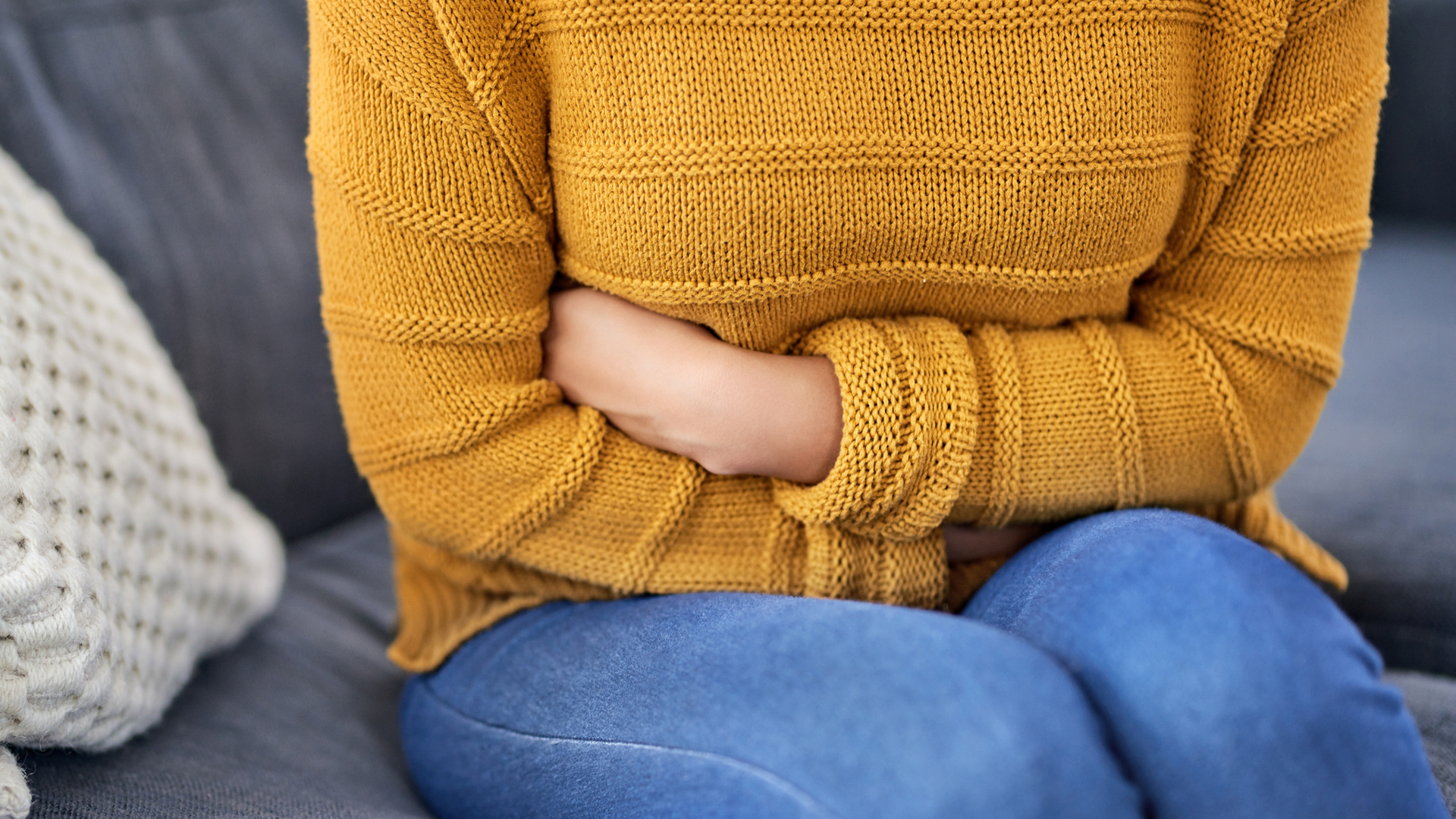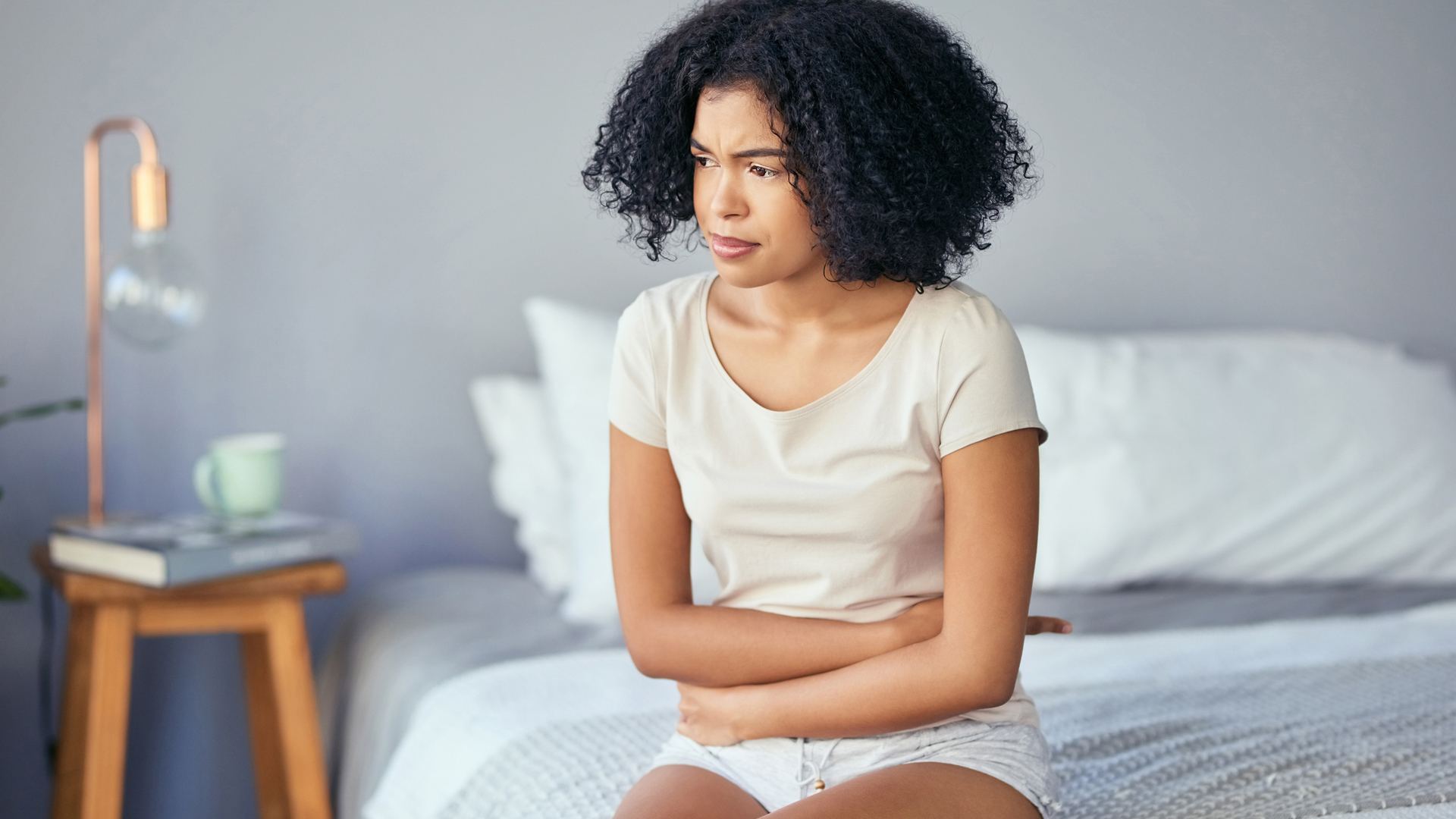What causes bloating?
A bloated and gassy stomach can be uncomfortable — but what causes bloating in the first place? We asked the experts

Get the world’s most fascinating discoveries delivered straight to your inbox.
You are now subscribed
Your newsletter sign-up was successful
Want to add more newsletters?

Delivered Daily
Daily Newsletter
Sign up for the latest discoveries, groundbreaking research and fascinating breakthroughs that impact you and the wider world direct to your inbox.

Once a week
Life's Little Mysteries
Feed your curiosity with an exclusive mystery every week, solved with science and delivered direct to your inbox before it's seen anywhere else.

Once a week
How It Works
Sign up to our free science & technology newsletter for your weekly fix of fascinating articles, quick quizzes, amazing images, and more

Delivered daily
Space.com Newsletter
Breaking space news, the latest updates on rocket launches, skywatching events and more!

Once a month
Watch This Space
Sign up to our monthly entertainment newsletter to keep up with all our coverage of the latest sci-fi and space movies, tv shows, games and books.

Once a week
Night Sky This Week
Discover this week's must-see night sky events, moon phases, and stunning astrophotos. Sign up for our skywatching newsletter and explore the universe with us!
Join the club
Get full access to premium articles, exclusive features and a growing list of member rewards.
What causes bloating? Good or bad gut health can be the difference between living comfortably or struggling with uncomfortable symptoms such as pain, bloating and gas. There are several potential culprits that might be causing bloating, and most of them relate to the food you eat and how you eat it.
Some bloating, particularly after a big meal or if you’ve eaten too quickly, is perfectly normal. But if your bloating is persistent, painful or doesn’t seem to go away after a period without food, you may want to consult your doctor. In this case, the bloating may be due to an underlying condition such as inflammatory bowel disease or irritable bowel syndrome, or a food intolerance. Here, we’ve spoken to experts about the main causes of bloating and what you might be able to do to prevent them.
If you’re looking for ways to improve your digestion or are considering an elimination diet to identify any food sensitivities, then we’ve also put together some handy guides to help you.
What is bloating?
Bloating is something all of us will likely experience at some point in our lives. It can be uncomfortable, even painful, but is often caused by gas moving around our digestive systems. However, bloating can also be a symptom of other conditions, such as celiac disease, IBD and IBS, as well as common food intolerances like lactose intolerance.
Bloating is where your tummy gets tight and feels full — sometimes it may even feel sore. This is often accompanied by abdominal distention, where your belly will look visibly larger or pushed out from your body by its contents.
Roxana Ehsani, a registered dietitian nutritionist and a national media spokesperson for the Academy of Nutrition and Dietetics, explains that sometimes anxiety or stress can contribute to bloating. “Sometimes a person may be super tense or stressed too which can inhibit a healthy digestive tract from working well,” she says.

Roxana Ehsani is a Board-Certified Specialist in Sports Dietetics and a National Media Spokesperson for the Academy of Nutrition and Dietetics. She holds a Bachelors of Science in Human Nutrition, Foods and Exercise from Virginia Tech and a Masters of Science in Clinical Nutrition and Dietetics from the University of Pittsburgh and completed her dietetic internship at the University of Pittsburgh Medical Center.
What causes bloating?
According to Dr. Marion Sloan, a medical doctor and Chair of the Primary Care Society for Gastroenterology in the United Kingdom, bloating can just be your body working hard. “A ‘normal’ body produces about four pints of gas a day and this passes either up or down,” she explains. “Vegetables, particularly beans and greens, create a lot of gas and the simple sugars in fruit ferment to produce gas. The intestines fill with gas and your waistline gets wider.”
Get the world’s most fascinating discoveries delivered straight to your inbox.

Dr. Sloan has been a medical doctor for over 38 years. She has a career-long interest in gastroenterology and is Chair of the Primary Care Society for Gastroenterology in the U.K.
Gas
The most common cause of bloating is trapped wind. When we eat, the bacteria in our guts break down the food into simpler forms that can be easily absorbed through the lining of our digestive system. However, this process and the bacteria themselves create gasses like methane, carbon dioxide and hydrogen, which has to go somewhere. According to Dr. Sloan, it is normal to pass wind 14 times a day, up or down.
Constipation
If you find yourself struggling to pass a bowel movement or that you have rocky, small stools, you may be constipated. Constipation can cause bloating because it takes longer for your bowel to empty, giving bacteria longer to ferment food, which causes more gas production. You can counter constipation with a diet high in fiber and by plenty of drinking water. Ehsani adds that dehydration can lead to constipation and bloating.
Gynecological conditions
For women in particular, inflammation and hormones around a period can cause bloating, as can hormone-related conditions such as endometriosis and polycystic ovary syndrome. Inflammation in this area can sometimes be seen from the outside, with increased abdominal size, as seen in a review in American Family Physician. Fibroids (non cancerous growths that develop in and around the womb) vary in size and can grow larger with levels of the hormone estrogen, often shrinking down again after menopause. These can cause heavier periods and may make your tummy look bigger.
Eating habits
Eating too much or eating very quickly can cause bloating. If you eat a lot of food, it will make a noticeable difference to the size of your stomach, which is why our bodies tend to change slightly after eating. Eating too quickly can cause bloating because when you gulp your food, you also take in air and swallow it into your digestive tract.
Disordered eating habits can also lead to gastrointestinal difficulties, according to the American Journal of Gastroenterology, and patients with eating disorders often seek help for gastrointestinal difficulties at some point over the course of their illness.

Weight gain
Sometimes what we think is bloating is just an increase in abdominal body fat. Our bodies try to store fat around important organs to keep them warm and protected, which is called visceral fat. If you still look ‘bloated’ first thing in the morning on an empty stomach, it might be that you’ve gained some abdominal fat.
Gas tends to escape during the night and our stomachs are at their emptiest in the mornings, so this is the best time to check. An article in Gastroenterology and Hepatology also links obesity to functional gastrointestinal conditions (such as IBS) indicating there is a large overlap between the two. This could mean that weight gain may make you more likely to experience gastrointestinal systems.
Food intolerances
If you don’t tolerate certain foods very well, you may be causing irritation within your gut, which can lead to inflammation, pain and bloating. A low FODMAP diet cuts out a lot of fermentable foods, which many people struggle to absorb in the small intestine. After passing through the small intestine (where there shouldn’t be many bacteria) if these foods are not absorbed, they can ferment further down the digestive tract, causing gas production and bloating.
Small intestine bacterial overgrowth
Some people also have a condition called SIBO (small intestine bacterial overgrowth) where they have an overgrowth of gut bacteria in their small intestine. According to a review in the journal Clinical and Translational Gastroenterology, this can lead to foods fermenting in this space and causing gas and bloating.
Underlying conditions
Gastric conditions such as IBD and IBS can cause bloating, as can an imbalance in your gut microbiome. If your bloating doesn’t go away in the morning, it is worth going to the doctor to ensure that there is nothing more serious going on.
A review in the Nutrition Journal indicates that one of the main symptoms of IBS is bloating/abdominal distention, and a study in Neurogastroenterology and Motility indicates that these symptoms are more common and more severe in those with IBS and IBD than in the general population, with a difference in severity between genders.
How long does bloating last?
Dr. Sloan says that you’ll be bloated until you release the trapped gas. “It lasts till it's all been jet propelled out into the open,” she says. “It's uncomfortable for a few hours and then normally settles down. If it is very persistent or accompanied by excessive abdominal pain, then it's time to dial the doctor.”

How can you prevent bloating?
If you want to prevent getting bloated in the first place, Dr. Sloan recommends careful, slow eating, as well as not talking while eating, sitting and enjoying a meal and not rushing off straight away. “Also learning which foods create gas in your tummy,” she says. “It can be different for different people and it depends on which bacteria you have living in your colon. Beans, cabbage, plums, peaches and nectarines are all healthy choices but are particularly likely to create more gas.”
Eshani adds: “If a person is a fast eater, I remind them to use simple tactics like remember to put down your fork in between bites of food, chew slowly and well. Try to limit and turn off distractions causing you to not pay attention to how fast you’re eating. Also try to treat each meal — or at least one meal a day — as if you were at a cheese tasting or wine tasting, looking at your food, notice its smell, the flavors, taking small sips and bites and savoring each bite.”
This article is for informational purposes only and is not meant to offer medical advice.

Lou Mudge is a health writer based in Bath, United Kingdom for Future PLC. She holds an undergraduate degree in creative writing from Bath Spa University, and her work has appeared in Live Science, Tom's Guide, Fit & Well, Coach, T3, and Tech Radar, among others. She regularly writes about health and fitness-related topics such as air quality, gut health, diet and nutrition and the impacts these things have on our lives.
She has worked for the University of Bath on a chemistry research project and produced a short book in collaboration with the department of education at Bath Spa University.
 Live Science Plus
Live Science Plus










